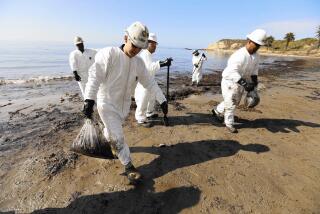Kazakh Plans by Chevron Rekindled
- Share via
In a move that could help Chevron Corp. exploit its $10-billion investment in the Tengiz oil field, Russia, Kazakhstan and Oman said they will offer a half stake in the proposed $1.2-billion pipeline to deep-pocketed oil companies.
For more than two years, Chevron has refused to bankroll the 930-mile pipeline project because Oman was to get a one-third stake without paying a third of the costs. Oman has now agreed to take about a 10% cut of the Caspian Pipeline Consortium that it organized.
“We’re encouraged by this development, but it’s a little early,” Mike Libbey, a Chevron spokesman, said from the company’s headquarters in San Francisco. “It’s moving in the direction of a viable business structure.”
Chevron will participate in talks with the consortium scheduled for Friday in London, and the company hasn’t ruled out joining forces with other Western companies to bankroll the project if an agreement can be worked out, Libbey said.
Edward M. Smith, the consortium’s general director, said several other Western companies have shown interest in participating, including Los Angeles-based Atlantic Richfield Co.; Fairfax, Va.-based Mobil Corp.; British Gas; and Italy’s Agip.
Possible Russian partners in the project include Lukoil, one of the nation’s biggest oil companies; RAO Transneft, the nation’s biggest pipeline operator; and RAO Rosneft, Smith said.
“It’s conceivable that with aggressive financing, we could begin operations in late 1998 or 1999,” depending on how soon the investors can come up with financing, Smith said.
Oman has agreed to reduce its shareholding to “about 10%,” Smith said, with Russia and Kazakhstan contributing assets such as pipelines and pumping stations to bring the government-owned part of the consortium to 50%.
Like other petroleum-rich Central Asian republics such as Azerbaijan and Turkmenistan, Kazakhstan must develop new pipelines because the existing ones can handle only a fraction of the volume oil companies hope to pump from vast reserves.
The Persian Gulf sultanate of Oman was among the first to organize a pipeline project, securing support from Kazakhstan and Russia, which is the location of the Black Sea port where the pipeline would deliver crude for export by tanker.
More to Read
Inside the business of entertainment
The Wide Shot brings you news, analysis and insights on everything from streaming wars to production — and what it all means for the future.
You may occasionally receive promotional content from the Los Angeles Times.










